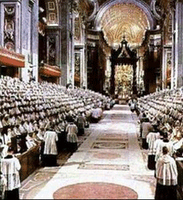Tuesday, August 22, 2006
The liturgists love this section; it is a good one, underscoring the role of the sacraments in building up and stengthening the Church. First, a reiteration of the initiation sacraments and their role in building up the Church:
It is through the sacraments and the exercise of the virtues that the sacred nature and organic structure of the priestly community is brought into operation. Incorporated in the Church through baptism, the faithful are destined by the baptismal character for the worship of the Christian religion; reborn as (children) of God they must confess before (others) the faith which they have received from God through the Church (Cfr. S. Thomas, Summa Theol. III, q. 63, a. 2.). They are more perfectly bound to the Church by the sacrament of Confirmation, and the Holy Spirit endows them with special strength so that they are more strictly obliged to spread and defend the faith, both by word and by deed, as true witnesses of Christ (Cfr. S. Cyrillus Hieros., Catech. 17, de Spiritu Sancto, II, 35-37: PG 33, 1009-1012. Nic. Cabasilas, De vita in Christo, lib. III, de utilitate chrismatis: PG 150, 569-580. S. Thomas, Summa Theol. III, q. 65, a. 3 et q. 72, a. 1 et 5.). Taking part in the eucharistic sacrifice, which is the fount and apex of the whole Christian life, they offer the Divine Victim to God, and offer themselves along with It.(Cfr. Pius XII, Litt. Encycl. Mediator Dei 20 nov. 1947: AAS 39 (1947), paesertim p. 552 s.) Thus both by reason of the offering and through Holy Communion all take part in this liturgical service, not indeed, all in the same way but each in that way which is proper to himself. Strengthened in Holy Communion by the Body of Christ, they then manifest in a concrete way that unity of the people of God which is suitably signified and wondrously brought about by this most august sacrament.
This is (no irony) rich: Baptism imparts a "destiny" to the believer. Through baptism they are made for Christian worship. It calls them, draws them to God and to one another. If Thomas Aquinas said so before the Reformation, it cannot be any less true today.
Confirmation binds us more closely to the mission of the Church. We are "strictly obliged" to witness by our words and example.
And though the priesthood of believers is distinct from that of Holy Orders, we laity offer the Sacrifice. Terminology such as "assisting at Mass" would seem to be completely out of the picture for being wholly inaccurate of what takes place at Mass. We have a reminder that the Eucharist is font and apex (source and summit). We have a definition of our role: we take part; we participate. Lay people are not passive spectators to a sacrifice being offered by a single priest. And lastly, one of the graces of the sacrament is unity.
Those who approach the sacrament of Penance obtain pardon from the mercy of God for the offence committed against Him and are at the same time reconciled with the Church, which they have wounded by their sins, and which by charity, example, and prayer seeks their conversion. By the sacred anointing of the sick and the prayer of her priests the whole Church commends the sick to the suffering and glorified Lord, asking that He may lighten their suffering and save them;(cf. James 5:13-16) she exhorts them, moreover, to contribute to the welfare of the whole people of God by associating themselves freely with the passion and death of Christ.(Cf. Rom; 8,17 Col. 1, 24; 2 Tim. 2, 11-12; 1 Pet. 4, 13)
Note the council bishops have drawn the principle of charity into these two sacraments. Then a brief spot on orders and marriage:
Those of the faithful who are consecrated by Holy Orders are appointed to feed the Church in Christ's name with the word and the grace of God. Finally, Christian spouses, in virtue of the sacrament of Matrimony, whereby they signify and partake of the mystery of that unity and fruitful love which exists between Christ and His Church,(Cf. Eph. 5, 32) help each other to attain to holiness in their married life and in the rearing and education of their children. By reason of their state and rank in life they have their own special gift among the people of God.(Cf. 1 Cor. 7, 7) (I Cor. 7, 7: . Unusquisque proprium donum (idion charisma) habet ex Deo: alius quidem sic alius vero sic .. Cfr. S. Augustinus, De Dono Persev. 14, 37: PL 45, 1015 s.: Non tantum continenti Dei donum est, sed coniugatorum etiam castitas.) From the wedlock of Christians there comes the family, in which new citizens of human society are born, who by the grace of the Holy Spirit received in baptism are made children of God, thus perpetuating the people of God through the centuries. The family is, so to speak, the domestic church. In it parents should, by their word and example, be the first preachers of the faith to their children; they should encourage them in the vocation which is proper to each of them, fostering with special care vocation to a sacred state.
A few words on marriage ... First note the aspiration to holiness listed first before the rearing of children. And second, note the last phrase and the easy conclusion at which one can arrive suggesting that the parental role is to foster vocation to a sacred state--nothing here suggests that is not marriage as well as religious life.
Fortified by so many and such powerful means of salvation, all the faithful, whatever their condition or state, are called by the Lord, each in his own way, to that perfect holiness whereby the Father Himself is perfect.
Thoughts? Don't be bashful.
